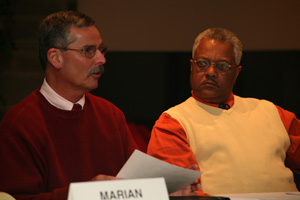The Faculty Council passed a series of guidelines Tuesday that, if enacted, would require students to sign their course evaluations and standardize administration procedures.

The changes were based on discussions held throughout the year by an ad hoc council committee on student evaluations.
The new guidelines suggest evaluations be completed within the final two weeks of a semester course, or one and a half weeks of a block course. Students will be given a minimum of 15 minutes to complete the evaluations, but the time professors choose to administer the evaluations will be left to their discretion. Professors will have to inform students of evaluations before they are given.
Students will also be required to sign their evaluations. The names will be removed before the professor sees the evaluations and will only be available to the dean and department chairs. Department chairs and deans will not have access to student signatures for the courses they teach.
Sophomore Jill Cadby, vice president of academics for SGA and one of two students to serve on the committee, said she hopes requiring students to identify themselves would keep evaluations professional because it gives students a sense of ownership.
“Teachers weren’t getting effective, thoughtful responses,” Cadby said. “When [students] own up to what they have to say … they now can constructively criticize. But their name is going to be [attached] to it.”
The proposal will be sent to the college’s Academic Policy Committee at the end of March. Luke Keller, assistant professor of physics and chair of the committee, said he hopes the work of the evaluations committee will allow the policy committee to vote quickly.
Last spring, the Student Government Association presented a document to the council called ROSE (Report of Student Experience), which proposed a set of nearly 20 questions to include on student evaluations and a standardized way of distributing them. Cadby said the Faculty Council turned down the proposal because they felt the questions SGA had chosen were too restricting.
“They wouldn’t get to add their own questions, it would take students too much time,” Cadby said. “Some felt the questions didn’t adequately represent them.”
Because of the proposal, the Faculty Council decided to create a separate committee to work with SGA and create a process every member could agree on, according to Keller.
Darius Conger, assistant professor of economics and a member of the evaluations committee, said standardizing student evaluations had been an issue among faculty members for a while.
“[Members of the Faculty Council] had been worrying about this … but it was not percolating to the surface until SGA brought their idea before the council,” he said.
Keller said the new guidelines only address the administration of student evaluations, not the actual content.
“Now we have to work on what the actual questions will be,” Keller said.
Conger said standardizing questions may be easier than standardizing administration, but it will still be a challenge because of the “heterogeneity of disciplines” at the college.
“By the time evaluations roll around in the fall, that’s probably a pretty good goal for seeing these changes,” he said.
Keller said the time the Faculty Council spent creating the proposal before passing it showed that faculty take evaluations seriously.
“Evaluations affect us profoundly,” Keller said. “I’m really happy the council agreed this is a very important thing to be doing.”







